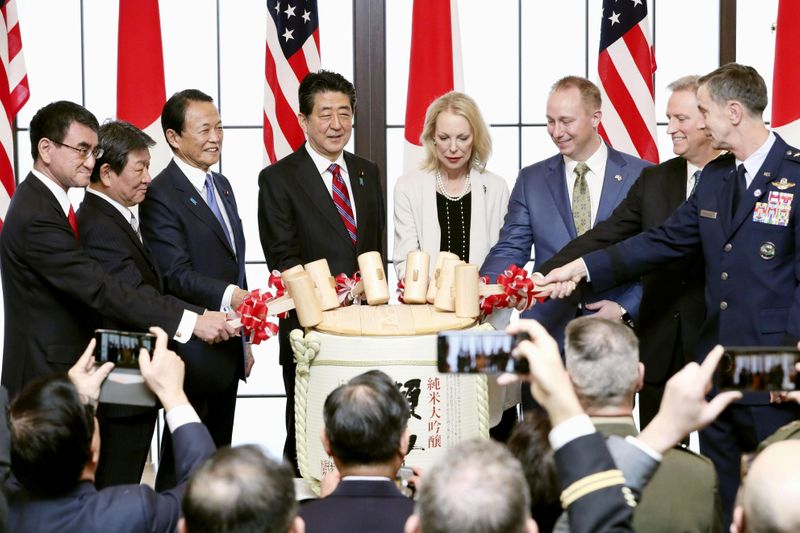TOKYO (Reuters) - President Donald Trump marked the 60th anniversary of the signing of the security treaty between the United States and Japan with a call for a stronger and deeper alliance between the two countries, despite criticizing the pact six months ago.
"As the security environment continues to evolve and new challenges arise, it is essential that our alliance further strengthen and deepen," Trump said in a statement dated Jan. 18.
"I am confident that in the months and years ahead, Japan's contributions to our mutual security will continue to grow, and the alliance will continue to thrive."
Last June, Trump told a news conference in Japan that the treaty - signed six decades ago on Sunday and the linchpin of Japan's defense policy - was "unfair" and should be changed, echoing his long-held view that Japan is a free-rider on defense.
Trump at the time added he was not thinking of withdrawing from the pact.
Japanese Prime Minister Shinzo Abe on Sunday called for making the treaty more robust.
"We have elevated the relationship to one in which each of us, the U.S. and Japan, protects the other, thereby giving further force to the alliance," Abe said at a Tokyo reception to mark the anniversary of the signing.
"Going forward, it is incumbent upon us to make it even more robust, to make it a pillar for safeguarding peace and security in both outer space and cyberspace."
The treaty obligates the United States to defend Japan, which under its U.S.-drafted constitution renounced the right to wage war after World War Two. Japan in return provides military bases used by the United States to project power in Asia.
The treaty was first signed in 1951 and revised in 1960 under Abe's grandfather, then-premier Nobusuke Kishi. Kishi was forced to step down afterwards following a massive public outcry from Japanese critics who feared the pact would pull their country into conflict.
Abe since taking office in 2012 has raised Japan's defense spending by 10% after years of decline and his government in 2014 reinterpreted the constitution to allow Japanese troops to fight overseas for the first time since World War Two.
Although generally supportive of the alliance, Japanese voters remain concerned about their country getting dragged into U.S.-led conflicts. A recent survey by Kyodo news agency showed 58.4% opposed Tokyo's decision to dispatch a warship and patrol planes to the Middle East to help protect ships bringing goods to Japan.
Trump's administration has also pushed for Japan to pay more for U.S. forces stationed in the country. Under an agreement reached in 2015, Japan pledged to increase its spending for U.S. forces stationed there by 1.4% over the following five years to 189.3 billion yen ($1.72 billion) per year on average.
